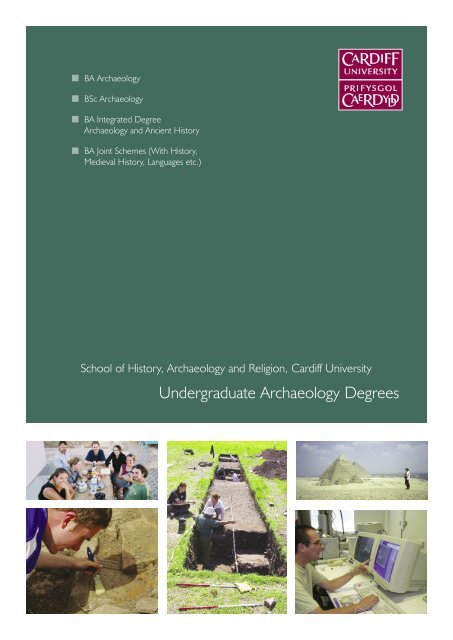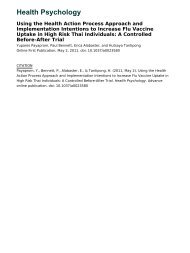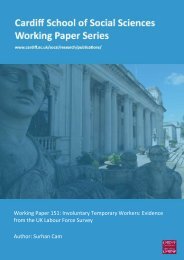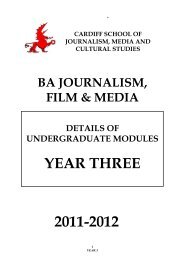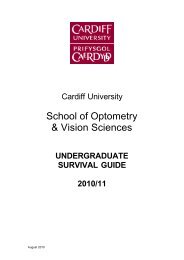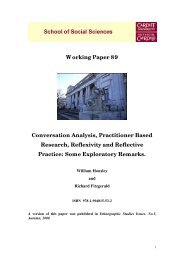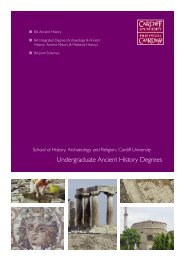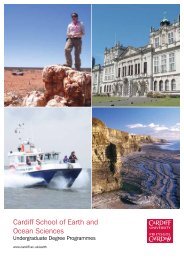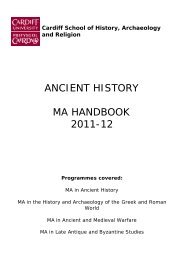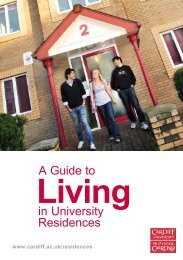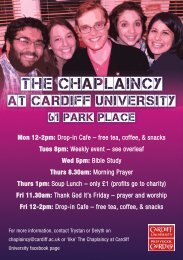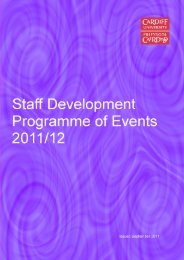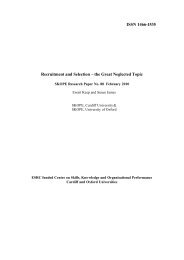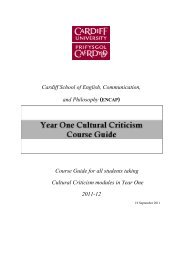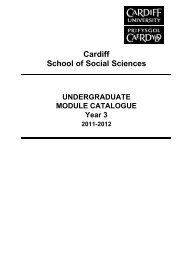School of History, Archaeology and Religion, Cardiff University
School of History, Archaeology and Religion, Cardiff University
School of History, Archaeology and Religion, Cardiff University
You also want an ePaper? Increase the reach of your titles
YUMPU automatically turns print PDFs into web optimized ePapers that Google loves.
BA <strong>Archaeology</strong><br />
BSc <strong>Archaeology</strong><br />
BA Integrated Degree<br />
<strong>Archaeology</strong> <strong>and</strong> Ancient <strong>History</strong><br />
BA Joint Schemes (With <strong>History</strong>,<br />
Medieval <strong>History</strong>, Languages etc.)<br />
<strong>School</strong> <strong>of</strong> <strong>History</strong>, <strong>Archaeology</strong> <strong>and</strong> <strong>Religion</strong>, <strong>Cardiff</strong> <strong>University</strong><br />
Undergraduate <strong>Archaeology</strong> Degrees
<strong>Cardiff</strong> <strong>University</strong> <strong>and</strong> <strong>Cardiff</strong> <strong>School</strong> <strong>of</strong> <strong>History</strong>,<br />
<strong>Archaeology</strong> <strong>and</strong> <strong>Religion</strong><br />
<strong>Cardiff</strong> <strong>University</strong> is one <strong>of</strong> the UK’s<br />
major teaching <strong>and</strong> research<br />
universities <strong>and</strong> a member <strong>of</strong> the<br />
elite ‘Russell Group’.<br />
Located in the centre <strong>of</strong> the capital<br />
city <strong>of</strong> Wales, it has an international<br />
reputation for the quality <strong>of</strong> its work<br />
that attracts staff <strong>and</strong> students from<br />
around the world.<br />
<strong>Cardiff</strong> <strong>School</strong> <strong>of</strong> <strong>History</strong>, <strong>Archaeology</strong><br />
<strong>and</strong> <strong>Religion</strong> is home to four<br />
Departments: Ancient <strong>History</strong>,<br />
<strong>Archaeology</strong> & Conservation, <strong>History</strong> &<br />
Welsh <strong>History</strong> <strong>and</strong> Religious Studies &<br />
Theology. The <strong>School</strong> brings together 60<br />
academic staff <strong>and</strong> around 800<br />
undergraduates <strong>and</strong> 200 postgraduates in<br />
the Humanities Building, next to the Arts<br />
<strong>and</strong> Social Studies Library, <strong>and</strong> just a short<br />
walk from the heart <strong>of</strong> the capital.<br />
<strong>Archaeology</strong> at <strong>Cardiff</strong> has been established<br />
for over 80 years <strong>and</strong> has attracted scholars<br />
such as Sir Mortimer Wheeler <strong>and</strong><br />
Pr<strong>of</strong>essor R.J.C. Atkinson. There are close<br />
links between the <strong>Archaeology</strong><br />
Department <strong>and</strong> the National Museum<br />
<strong>Cardiff</strong> whose site is located only a few<br />
hundred metres from the <strong>School</strong>.<br />
The <strong>Archaeology</strong> Department, which<br />
includes Archaeological Conservation (a<br />
separate brochure for Conservation<br />
degrees is available) has an international<br />
reputation for its teaching <strong>and</strong> research. It<br />
has long established esteem for producing<br />
pr<strong>of</strong>essional archaeologists (including many<br />
university lecturers <strong>and</strong> pr<strong>of</strong>essors, museum<br />
pr<strong>of</strong>essionals <strong>and</strong> a former head <strong>of</strong> English<br />
Heritage) as well as providing a range <strong>of</strong><br />
skills suitable for those wishing to find<br />
employment in other sectors.<br />
The transferable skills provided by an<br />
archaeology degree, which include<br />
computing, research, illustration <strong>and</strong><br />
writing skills, are increasingly sought after<br />
by employers <strong>and</strong> <strong>of</strong>fer our graduates a<br />
wide choice <strong>of</strong> career opportunities both<br />
within <strong>and</strong> outside archaeology.<br />
The <strong>School</strong> itself is housed in a modern<br />
building which includes purpose built<br />
conservation <strong>and</strong> archaeology laboratories,<br />
which were completely refurbished in<br />
2001. These include a dedicated laboratory<br />
for digital photography, graphics laboratory,<br />
Scanning Electron Microscopy suite (one <strong>of</strong><br />
the few <strong>Archaeology</strong> Departments to have<br />
such equipment), osteology laboratory <strong>and</strong><br />
general purpose teaching <strong>and</strong> research<br />
laboratories, each with dedicated members<br />
<strong>of</strong> staff.<br />
The range <strong>of</strong> teaching within the<br />
<strong>Archaeology</strong> Department spans from the<br />
earliest Hominids to the late Medieval<br />
period, <strong>and</strong> covers Britain, Europe, Egypt<br />
<strong>and</strong> the Aegean. The ‘when <strong>and</strong> where’<br />
modules, dealing with specific regions <strong>and</strong><br />
periods, are supported by numerous<br />
practical <strong>and</strong> theoretical modules providing<br />
students with a broad view <strong>of</strong> the subject.<br />
What the papers say about us<br />
‘<strong>Cardiff</strong> is long established as the front-runner<br />
in Welsh higher education <strong>and</strong> a leading<br />
player in the UK <strong>and</strong> beyond. It is a member<br />
<strong>of</strong> the Russell Group <strong>of</strong> 20 research-led<br />
universities <strong>and</strong> has two Nobel Laureates on<br />
its staff. Teaching quality is also highly rated<br />
…the Quality Assurance Agency complimented<br />
the university on its ‘powerful academic<br />
vision <strong>and</strong> well-developed <strong>and</strong> effectively<br />
articulated mission to achieve excellence in<br />
teaching <strong>and</strong> research’. <strong>Cardiff</strong> has done<br />
well in every edition <strong>of</strong> the National Student<br />
Survey, finishing just outside the top 30<br />
in 2009.’<br />
Times Good <strong>University</strong> Guide, June 2011<br />
‘<strong>Cardiff</strong> seems to have it all: gr<strong>and</strong> civic<br />
architecture in a breezy waterside location,<br />
super-smart city bars <strong>and</strong> venues just a<br />
short hop from lovely countryside. The<br />
university is as confident <strong>and</strong> forwardlooking<br />
as the city it’s located in, <strong>and</strong> has<br />
an excellent reputation for the quality <strong>of</strong> its<br />
teaching <strong>and</strong> research. Almost 60% <strong>of</strong> its<br />
research is ranked as world-leading <strong>and</strong> it is<br />
a member <strong>of</strong> the Russell group <strong>of</strong> leading<br />
research universities. There are<br />
approximately 27,000 students, including<br />
more than 3,000 from over 100 countries<br />
outside the UK, helping to create a vibrant,<br />
cosmopolitan community.’<br />
The Guardian 8 June 2010<br />
Contacts<br />
Information on <strong>Cardiff</strong> <strong>and</strong> the university<br />
for prospective students can be found at<br />
www.cardiff.ac.uk/for/prospective/index.html<br />
For more information on our degrees<br />
contact the Admissions Tutor for<br />
<strong>Archaeology</strong>.<br />
Email:<br />
archaeologyugadmissions@cardiff.ac.uk<br />
Tel: +44 (0)29 2087 4259<br />
2 • SCHOOL OF HISTORY, ARCHAEOLOGY AND RELIGION, ARCHAEOLOGY DEPARTMENT, CARDIFF UNIVERSITY
Which Degree is for Me?<br />
BA <strong>Archaeology</strong><br />
This scheme is ideal for those whose<br />
particular interest in archaeology is<br />
historical, theoretical or field-work<br />
based. It <strong>of</strong>fers a wide range <strong>of</strong><br />
archaeological experience, including<br />
8 weeks <strong>of</strong> fully-funded excavation,<br />
in-house where possible, <strong>and</strong> is open to<br />
students with a wide range <strong>of</strong><br />
Arts/Humanities as well as Science<br />
A-Levels.<br />
BSc <strong>Archaeology</strong><br />
Like the BA course, the BSc <strong>of</strong>fers a<br />
wide range <strong>of</strong> experience, but focuses<br />
on the scientific aspects <strong>of</strong> archaeology,<br />
providing students with the opportunity<br />
to learn a range <strong>of</strong> analytical techniques<br />
<strong>and</strong> an in-depth insight into the ways in<br />
which science is used in archaeology.<br />
The course still provides access to<br />
historically based <strong>and</strong> theoretical modules,<br />
with the 8 weeks <strong>of</strong> compulsory<br />
excavation experience provided on the<br />
BA scheme, but is normally open only<br />
to students with at least one science<br />
subject at A-Level.<br />
BA <strong>Archaeology</strong> & Ancient <strong>History</strong><br />
(Integrated)<br />
This scheme provides students with the<br />
opportunity to study key elements <strong>of</strong><br />
both archaeology <strong>and</strong> history <strong>of</strong> the<br />
Classical World, <strong>and</strong> draws on modules<br />
taught by both the <strong>Archaeology</strong> <strong>and</strong><br />
Ancient <strong>History</strong> Departments <strong>of</strong> the<br />
<strong>School</strong>. It includes 8 weeks <strong>of</strong> fully-funded<br />
excavation experience, led by <strong>Cardiff</strong><br />
<strong>University</strong> where possible.<br />
BA Joint Schemes<br />
Because <strong>of</strong> the modular nature <strong>of</strong> the<br />
<strong>Cardiff</strong> degree schemes it is possible to<br />
study archaeology in combination with a<br />
range <strong>of</strong> other subjects both within the<br />
<strong>Cardiff</strong> <strong>School</strong> <strong>of</strong> <strong>History</strong>, <strong>Archaeology</strong><br />
<strong>and</strong> <strong>Religion</strong> <strong>and</strong> outside it. Popular<br />
combinations include <strong>Archaeology</strong> <strong>and</strong><br />
<strong>History</strong>, <strong>Archaeology</strong> <strong>and</strong> Medieval<br />
<strong>History</strong>, <strong>Archaeology</strong> <strong>and</strong> Education <strong>and</strong><br />
<strong>Archaeology</strong> with a language subject.<br />
Many other combinations are also<br />
possible <strong>and</strong> students interested in these<br />
should contact the <strong>Archaeology</strong><br />
Admissions Tutor for further information.<br />
Field trips <strong>and</strong> excavation<br />
<strong>Archaeology</strong> is a practical <strong>and</strong> visual subject,<br />
<strong>and</strong> as a result there are frequent field<br />
trips to archaeological sites <strong>and</strong> museums<br />
<strong>of</strong> interest. <strong>Cardiff</strong> is surrounded by<br />
important archaeological l<strong>and</strong>scapes <strong>and</strong><br />
monuments, including Roman forts <strong>and</strong><br />
towns, Prehistoric settlements <strong>and</strong> burial<br />
sites, <strong>and</strong> Medieval castles. The city is also<br />
well placed for access to the great<br />
archaeological sites <strong>of</strong> southern Engl<strong>and</strong><br />
<strong>and</strong> field trips both within Wales <strong>and</strong><br />
Engl<strong>and</strong> are a regular feature <strong>of</strong> our courses.<br />
Excavation forms a compulsory, <strong>and</strong> highly<br />
popular, element <strong>of</strong> the <strong>Cardiff</strong> degrees.<br />
Students undertake two 4 week periods<br />
<strong>of</strong> excavation during their degree. Fullyfunded,<br />
these normally take place in the<br />
summer vacation at the end <strong>of</strong> Year One<br />
<strong>and</strong> end <strong>of</strong> Year Two, though other periods<br />
can sometimes be arranged. Unlike some<br />
other universities, <strong>Cardiff</strong> takes excavation<br />
training very seriously <strong>and</strong> includes it as<br />
part <strong>of</strong> our assessment process. This<br />
means that students are given proper<br />
credit for the work they carry out on<br />
digs, <strong>and</strong> that attendance on excavation is<br />
subsidised by the <strong>School</strong>. A wide range <strong>of</strong><br />
excavations are available each year, <strong>and</strong><br />
students have worked not only in Wales,<br />
but throughout the British Isles, Romania,<br />
Hungary, Greece <strong>and</strong> Egypt.<br />
Teaching <strong>and</strong> learning<br />
Because <strong>Archaeology</strong> is such a diverse<br />
subject it is taught using a wide range <strong>of</strong><br />
methods. Some modules are taught using<br />
lectures which may be supplemented by<br />
seminars <strong>and</strong> field visits, whilst other<br />
modules are seminar based, <strong>and</strong> still<br />
others concentrate on practical classes<br />
where, for example, human <strong>and</strong> animal<br />
bones might be examined <strong>and</strong> assessed<br />
using a forensic report.<br />
Science teaching takes place in the<br />
laboratories as well as lecture theatres<br />
within the <strong>School</strong> <strong>and</strong> provides students<br />
with an opportunity to use analytical<br />
techniques, <strong>and</strong> relate their results to their<br />
more historical <strong>and</strong> theoretical courses.<br />
All teaching at <strong>Cardiff</strong>, whether on the BA<br />
or BSc courses, is research-led. This<br />
means that students are being taught by<br />
individuals whose research is shaping <strong>and</strong><br />
re-defining the way we think about the<br />
past. <strong>Cardiff</strong> archaeology students are<br />
therefore at the forefront <strong>of</strong> new discoveries<br />
(<strong>and</strong> may be involved in making them<br />
themselves) <strong>and</strong> are well placed to<br />
undertake higher degrees in the future.<br />
Bursaries <strong>and</strong> grants<br />
For the latest information on scholarships<br />
<strong>and</strong> bursaries follow the links from our<br />
web page: www.cardiff.ac.uk/share/<br />
archaeology/study.html<br />
Typical <strong>of</strong>fers<br />
(BA & BSc): BBB-BBC<br />
(BA Integrated Degrees): ABB<br />
SCHOOL OF HISTORY, ARCHAEOLOGY AND RELIGION, ARCHAEOLOGY DEPARTMENT, CARDIFF UNIVERSITY • 3
Frequently Asked Questions<br />
Views from current <strong>and</strong> past students<br />
In choosing to study <strong>Archaeology</strong> at<br />
<strong>Cardiff</strong> you may have a range <strong>of</strong><br />
questions which can be answered by<br />
the information on our web pages.<br />
To supplement this we <strong>of</strong>fer the views<br />
<strong>of</strong> existing <strong>and</strong> past students by asking<br />
them to answer some <strong>of</strong> the most<br />
frequently asked questions.<br />
How big a change is<br />
university from school?<br />
Joanne from Cheltenham writes...<br />
“The change from <strong>School</strong> to Uni wasn’t as<br />
big or scary as I first imagined. In the first<br />
year your tutors try to make you feel<br />
welcome <strong>and</strong> are very friendly, <strong>and</strong> in the<br />
second year you feel very settled. Making<br />
friends is easy as you are all in the same<br />
boat. There’s a lot more freedom<br />
compared to school... There is plenty <strong>of</strong><br />
work, but all tutors are happy to help in<br />
my experience.”<br />
Why should I study<br />
<strong>Archaeology</strong> at <strong>Cardiff</strong>?<br />
Sally from Shaftesbury writes...<br />
“I was keen to take the archaeology<br />
course at <strong>Cardiff</strong> after I had viewed the<br />
department on one <strong>of</strong> the open days.<br />
The modules <strong>and</strong> excavations provided<br />
are varied <strong>and</strong> allow for a wide range <strong>of</strong><br />
interests. Despite my degree being a BA,<br />
students are also able to do many <strong>of</strong> the<br />
science based modules (<strong>and</strong> vice versa),<br />
allowing for the opportunity to develop a<br />
wider range <strong>of</strong> skills. Many <strong>of</strong> the lecturers<br />
are leading academics in their field <strong>and</strong> it<br />
has been both motivating <strong>and</strong> challenging<br />
to be taught by those involved in current<br />
research.”<br />
Maria from <strong>Cardiff</strong> writes...<br />
“The range <strong>of</strong> modules <strong>of</strong>fered in<br />
archaeology attracted me to study at<br />
<strong>Cardiff</strong>.”<br />
4 • SCHOOL OF HISTORY, ARCHAEOLOGY AND RELIGION, ARCHAEOLOGY DEPARTMENT, CARDIFF UNIVERSITY<br />
Can I only study<br />
British/European archaeology?<br />
Maria from <strong>Cardiff</strong> writes...<br />
“As well as learning about different periods<br />
in British archaeology you can also study<br />
the archaeology <strong>of</strong> the Middle East,<br />
Rome, Greece <strong>and</strong> Egypt.”<br />
How easy is it to adjust as an<br />
overseas student?<br />
Yiota from Greece writes...<br />
“Life in <strong>Cardiff</strong> as an undergraduate at<br />
SHARE (<strong>Cardiff</strong> <strong>School</strong> <strong>of</strong> <strong>History</strong>,<br />
<strong>Archaeology</strong> <strong>and</strong> <strong>Religion</strong>) is particularly<br />
exciting. As a first year, I had the chance to<br />
meet many other students from Britain<br />
<strong>and</strong> all around the world. This was a<br />
fascinating experience <strong>and</strong> was a great<br />
opportunity to interact with people from<br />
different cultural backgrounds. There are<br />
various student societies to cover almost, if<br />
not all, personal <strong>and</strong> intellectual interests.<br />
These are lively hubs, which link people<br />
with shared interests together. Being the<br />
first time that I was living abroad, I had to<br />
adjust myself to a different approach to<br />
organisation <strong>and</strong> study. Especially at the<br />
beginning this can be difficult, however,<br />
the support that both <strong>Cardiff</strong> <strong>University</strong><br />
<strong>and</strong> the Students Union provide, proved<br />
invaluable, not just <strong>of</strong> social nature, but for<br />
other issues (from personal to administrative).<br />
One might find this funny, but the main<br />
problem I had to face in my first year was<br />
the rainy weather, as I come from a hot<br />
sunny country. The vibrant life in Cathays,<br />
<strong>and</strong> student commitments, make it easier<br />
to adjust. A sudden rain shower has<br />
always been a good ‘excuse’ to visit the<br />
National Museum, which is just around the<br />
corner!”<br />
Will it help me find a career?<br />
Sally from Shaftesbury writes...<br />
“I’ve received a place on a primary teaching<br />
course for September, although I have found<br />
it possible to relate the skills <strong>and</strong> knowledge<br />
I have learnt to a wide range <strong>of</strong> job<br />
applications. <strong>Archaeology</strong> is most useful in<br />
providing students with the opportunity<br />
to develop both English <strong>and</strong> science skills;<br />
a balance not provided with many subjects.<br />
For those who enjoy a certain area <strong>of</strong><br />
archaeology, the masters <strong>and</strong> PhD courses<br />
at the department also provide the<br />
opportunity to specialise.”
SCHOOL OF HISTORY, ARCHAEOLOGY AND RELIGION, ARCHAEOLOGY DEPARTMENT, CARDIFF UNIVERSITY • 5
About the Staff<br />
The <strong>Archaeology</strong> Department <strong>of</strong> the<br />
<strong>School</strong> has 17 permanent members<br />
<strong>of</strong> staff. These include lecturers <strong>and</strong><br />
staff dedicated to running particular<br />
areas <strong>of</strong> the <strong>School</strong> such as<br />
Photography or Graphics.<br />
The lecturing staff can be grouped<br />
according to their research <strong>and</strong> teaching<br />
specialisms, Mir<strong>and</strong>a Aldhouse-Green,<br />
Dusan Boric, Niall Sharples <strong>and</strong><br />
Alasdair Whittle are mainly concerned<br />
with research on prehistoric Europe. This<br />
ranges from the transition to agriculture<br />
in particular regions <strong>and</strong> the development<br />
<strong>of</strong> archaeological l<strong>and</strong>scapes through to<br />
the archaeology <strong>of</strong> gender <strong>and</strong> the<br />
iconography <strong>of</strong> early art. A large number<br />
<strong>of</strong> opportunities are provided to participate<br />
in the excavation <strong>of</strong> prehistoric sites.<br />
As well as its reputation for prehistoric<br />
archaeology <strong>Cardiff</strong> is well known for the<br />
strength <strong>of</strong> its research in Roman <strong>and</strong><br />
Medieval archaeology. Roman archaeology<br />
is covered by Peter Guest <strong>and</strong> Ruth<br />
Westgate whose teaching <strong>and</strong> research,<br />
with colleagues in the Ancient <strong>History</strong><br />
Department, deals with various aspects <strong>of</strong><br />
the Roman world. Peter Guest specialises<br />
in the archaeology <strong>of</strong> Roman Britain as<br />
well as ancient coinage. The Medieval<br />
period is taught <strong>and</strong> researched by John<br />
Hines, Alan Lane <strong>and</strong> Denys Pringle,<br />
the first two specialising in Britain <strong>and</strong><br />
Europe, the last in the Near East <strong>and</strong> its<br />
Crusader castles <strong>and</strong> churches. Like their<br />
colleagues teaching prehistory, they also<br />
run field projects in which students<br />
participate.<br />
Dealing with the Mediterranean <strong>and</strong><br />
Egypt are James Whitley, who specialises<br />
in the archaeology <strong>of</strong> Bronze <strong>and</strong> Iron<br />
Age Greece <strong>and</strong> who excavates on Crete,<br />
<strong>and</strong> Paul Nicholson who runs research<br />
projects in Egypt. Again, <strong>Cardiff</strong> students<br />
have been involved in excavations in<br />
these areas.<br />
Those specialising in particular periods or<br />
regions have, <strong>of</strong> course, broader interests<br />
which <strong>of</strong>ten involve those members <strong>of</strong><br />
the Department who are involved in<br />
research into materials or the environment.<br />
Thus Ian Freestone is a specialist on<br />
archaeological materials <strong>and</strong> technology,<br />
<strong>and</strong> his interests link in with those <strong>of</strong><br />
Dave Watkinson, Jane Henderson <strong>and</strong><br />
Phil Parkes in Conservation as well as<br />
with Paul Nicholson who works on<br />
Egyptian materials. Jacqui Mulville, as<br />
well as conducting excavations in the<br />
Scilly Isles, specialises in Forensic <strong>and</strong><br />
Osteoarchaeology (the study <strong>of</strong> bones),<br />
<strong>and</strong> so trains students who can help on a<br />
variety <strong>of</strong> excavation projects, as well as<br />
conducting her own research in these areas.<br />
Archaeological research is increasingly<br />
high-tech, <strong>and</strong> this is reflected not only in<br />
the range <strong>of</strong> scientific equipment available,<br />
but also in our commitment to the<br />
research <strong>and</strong> teaching <strong>of</strong> computer<br />
applications. Steve Mills specialises in<br />
Geographical Information Systems (GIS)<br />
<strong>and</strong> has conducted research on soundscapes<br />
in Neolithic Romania, as well as<br />
early industrial Cornwall. Computerised<br />
illustration, as well as conventional<br />
drawing, is carried out by Ian Dennis<br />
<strong>and</strong> Howard Mason <strong>and</strong> complemented<br />
by a digital photography suite run by John<br />
Morgan. All three have been involved in<br />
the teaching <strong>of</strong> photography <strong>and</strong> graphics<br />
to undergraduate <strong>and</strong> postgraduate<br />
students. All computer applications are<br />
supported by Aled Cooke who, like<br />
Howard, John <strong>and</strong> Ian, provides this<br />
service for the whole <strong>School</strong>.<br />
The <strong>School</strong> has a number <strong>of</strong> administrative<br />
staff, one <strong>of</strong> them dedicated to the<br />
<strong>Archaeology</strong> Department.<br />
The many links between members <strong>of</strong> staff<br />
within <strong>Archaeology</strong>, <strong>and</strong> between<br />
<strong>Archaeology</strong>, Ancient <strong>History</strong>, <strong>History</strong> <strong>and</strong><br />
<strong>Religion</strong> make the <strong>School</strong> a lively <strong>and</strong><br />
dynamic research environment, <strong>and</strong> one<br />
into which students readily fit. Many<br />
future archaeologists get their first taste<br />
<strong>of</strong> real research whilst working with staff<br />
on their projects in the UK or abroad,<br />
<strong>and</strong> because our teaching is ‘research-led’<br />
students are at the cutting edge <strong>of</strong> the<br />
latest discoveries in archaeology.<br />
6 • SCHOOL OF HISTORY, ARCHAEOLOGY AND RELIGION, ARCHAEOLOGY DEPARTMENT, CARDIFF UNIVERSITY
Modules<br />
<strong>Archaeology</strong> modules<br />
typically on <strong>of</strong>fer<br />
Aegean Bronze Age:<br />
Emergence to Collapse<br />
Analysis <strong>of</strong> Artefacts<br />
Archaeological Dissertation (Year 3)<br />
Archaeological Fieldwork 1 & 2<br />
Archaeological Photography<br />
Archaeological Science<br />
Archaeological Science Dissertation<br />
<strong>Archaeology</strong> <strong>of</strong> Crusader Palestine<br />
Art & <strong>Archaeology</strong> <strong>of</strong> Archaic Greece<br />
Art & <strong>Archaeology</strong> <strong>of</strong> Classical Greece<br />
Bioarchaeology<br />
Complex Societies in Barbarian Europe<br />
Death <strong>and</strong> Burial in the Roman World<br />
Early Anglo-Saxon Engl<strong>and</strong><br />
Egyptian Funerary <strong>Archaeology</strong><br />
Environmental <strong>Archaeology</strong><br />
Forensic <strong>and</strong> Osteoarchaeology<br />
Independent Archaeological Study<br />
Independent Science Project<br />
Introduction to the Museum Environment<br />
Iron Age Britain<br />
Later Bronze Age Britain<br />
Material Study & Recording<br />
Mediaeval <strong>Archaeology</strong> (1066-1539)<br />
Middle <strong>and</strong> Later Saxon Engl<strong>and</strong><br />
Museology<br />
Neolithic <strong>and</strong> Early Bronze Age Britain<br />
Neolithic Beginnings: Last Foragers <strong>and</strong><br />
First Farmers in the Eastern Mediterranean<br />
Neolithic Europe<br />
Pharaohs <strong>of</strong> the Sun<br />
Post-Roman Celtic Britain<br />
Practical Projects 1 & 2<br />
Roman Britain<br />
Surveying <strong>and</strong> Prospecting<br />
Technology & Materials<br />
The <strong>Archaeology</strong> <strong>of</strong> Late Antiquity<br />
The <strong>History</strong> <strong>of</strong> Archaeological Thought<br />
Viking Age Sc<strong>and</strong>inavia<br />
Viking Britain <strong>and</strong> Irel<strong>and</strong><br />
SCHOOL OF HISTORY, ARCHAEOLOGY AND RELIGION, ARCHAEOLOGY DEPARTMENT, CARDIFF UNIVERSITY • 7
<strong>Cardiff</strong> <strong>School</strong> <strong>of</strong> <strong>History</strong>, <strong>Archaeology</strong> <strong>and</strong> <strong>Religion</strong><br />
<strong>Cardiff</strong> <strong>University</strong><br />
Humanities Building, Colum Drive<br />
<strong>Cardiff</strong> CF10 3EU<br />
Admissions Tutor for <strong>Archaeology</strong><br />
E-mail: archaeologyugadmissions@cardiff.ac.uk<br />
Telephone: +44 (0)29 2087 4259<br />
Design: designworld www.designworld.co.uk


